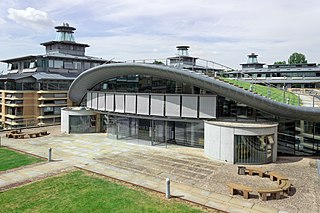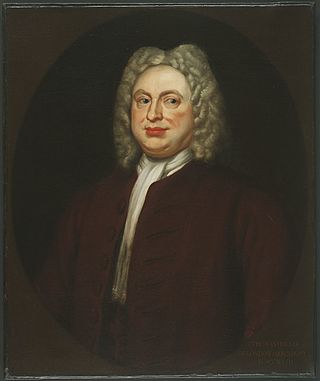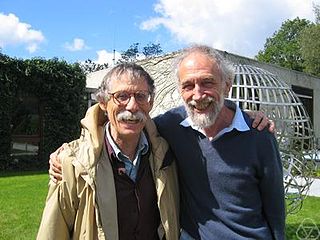The Lucasian Chair of Mathematics is a mathematics professorship in the University of Cambridge, England; its holder is known as the Lucasian Professor. The post was founded in 1663 by Henry Lucas, who was Cambridge University's Member of Parliament in 1639–1640, and it was officially established by King Charles II on 18 January 1664. It was described by The Daily Telegraph as one of the most prestigious academic posts in the world. Since its establishment, the professorship has been held by, among others, Isaac Newton, Charles Babbage, George Stokes, Joseph Larmor, Paul Dirac, and Stephen Hawking.
Queer studies, sexual diversity studies, or LGBT studies is the education of topics relating to sexual orientation and gender identity usually focusing on lesbian, gay, bisexual, transgender, gender dysphoria, asexual, queer, questioning, intersex people and cultures.

A Regius Professor is a university professor who has, or originally had, royal patronage or appointment. They are a unique feature of academia in the United Kingdom and Ireland. The first Regius Professorship was in the field of medicine, and founded by the Scottish King James IV at the University of Aberdeen in 1497. Regius chairs have since been instituted in various universities, in disciplines judged to be fundamental and for which there is a continuing and significant need. Each was established by an English, Scottish, or British monarch, and following proper advertisement and interview through the offices of the university and the national government, the current monarch still appoints the professor. This royal imprimatur, and the relative rarity of these professorships, means a Regius chair is prestigious and highly sought-after.

Harvard Divinity School (HDS) is one of the constituent schools of Harvard University in Cambridge, Massachusetts. The school's mission is to educate its students either in the academic study of religion or for leadership roles in religion, government, and service. It also caters to students from other Harvard schools that are interested in the former field. HDS is among a small group of university-based, non-denominational divinity schools in the United States.

A financial endowment is a legal structure for managing, and in many cases indefinitely perpetuating, a pool of financial, real estate, or other investments for a specific purpose according to the will of its founders and donors. Endowments are often structured so that the inflation-adjusted principal or "corpus" value is kept intact, while a portion of the fund can be spent each year, utilizing a prudent spending policy.

The Faculty of Mathematics at the University of Cambridge comprises the Department of Pure Mathematics and Mathematical Statistics (DPMMS) and the Department of Applied Mathematics and Theoretical Physics (DAMTP). It is housed in the Centre for Mathematical Sciences site in West Cambridge, alongside the Isaac Newton Institute. Many distinguished mathematicians have been members of the faculty.
The Beyer Chair of Applied Mathematics is an endowed professorial position in the Department of Mathematics, University of Manchester, England. The endowment came from the will of the celebrated locomotive designer and founder of locomotive builder Beyer, Peacock & Company, Charles Frederick Beyer. He was the university's largest single donor.
Fanghua Lin, also written as Fang-Hua Lin, is a Chinese-born American mathematician. He is currently the Silver Professor at the Courant Institute of Mathematical Sciences at New York University. He applies rigorous analysis to nonlinear systems and is a leader in this field.

David Leigh Donoho is an American statistician. He is a professor of statistics at Stanford University, where he is also the Anne T. and Robert M. Bass Professor in the Humanities and Sciences. His work includes the development of effective methods for the construction of low-dimensional representations for high-dimensional data problems, development of wavelets for denoising and compressed sensing. He was elected a Member of the American Philosophical Society in 2019.

The position of Savilian Professor of Geometry was established at the University of Oxford in 1619. It was founded by Sir Henry Savile, a mathematician and classical scholar who was Warden of Merton College, Oxford, and Provost of Eton College, reacting to what has been described by one 20th-century mathematician as "the wretched state of mathematical studies in England" at that time. He appointed Henry Briggs as the first professor. Edward Titchmarsh said when applying that he was not prepared to lecture on geometry, and the requirement was removed from the duties of the post to enable his appointment, although the title of the chair was not changed. The two Savilian chairs have been linked with professorial fellowships at New College, Oxford, since the late 19th century. Before then, for over 175 years until the middle of the 19th century, the geometry professors had an official residence adjoining the college in New College Lane.
Isaac Greenwood was an American mathematician. He was the first Hollisian Professor of Mathematics and Natural Philosophy at Harvard College.
The Adam Smith Professorship in Corporate Governance is an endowed chair established at the University of Cambridge, assigned to the Cambridge Judge Business School. It is one of many endowed chairs at Cambridge.

Thomas Hollis was a wealthy English merchant and a benefactor of Harvard University.
The Hollis Chair of Divinity is an endowed chair at Harvard Divinity School. It was established in 1721 by Thomas Hollis, a wealthy English merchant and benefactor of the university, at a salary of £80 per year. It is the oldest endowed chair in the United States, the first professorship in theology in the country, and in the early 19th century it was considered to be "the most prestigious endowed professorship in America".
The Hollis Chair of Mathematicks and Natural Philosophy [sic] is an endowed professorship established at Harvard College in 1727 by Thomas Hollis. The chair, now part of the Physics Department, is the second oldest at Harvard, and the oldest professorship in science in the United States.

Paul Frank Baum is an American mathematician, the Evan Pugh Professor of Mathematics at Pennsylvania State University. He is known for formulating the Baum–Connes conjecture with Alain Connes in the early 1980s.
Joseph McKean was the second holder of the Boylston Professorship of Rhetoric and Oratory at Harvard University. He was also the seventh librarian of the Massachusetts Historical Society, occupying that position from October 1809, to April, 1812. It was during this time that he created the first catalog of the Boston Athenæum.
The Perkins Professorship of Astronomy and Mathematics is an endowed professorship established at Harvard College in 1842 by James Perkins, Jr., (1761–1822).
The Erasmus Smith's Professor of Mathematics at Trinity College Dublin is one of two endowed mathematics positions at Trinity College Dublin (TCD), the other being the Donegall Lectureship at Trinity College Dublin. It was founded in 1762 and funded by the Erasmus Smith Trust, which was established by Erasmus Smith (1611–1691). Since 1851 the position has been funded by Trinity College.







